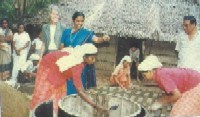Construction industry in India, as in most of the developing world, is dominated by the male skilled workers. Women serve as mere assistants. Even in Kerala, which is known for the high literacy rate of its women, their education up to graduation and post graduation and their entry into the professional and white collar sector, women are psychologically subjugated and powerless, never self-assertive or confident. This is most evident in the farm and construction sector, ridden with taboos which restrict women into limited spaces and deny them equal pay for work. It has been observed that women involved in the construction sector primarily assist skilled male masons and are paid lower than their male counterparts. It was this situation that Thresiamma Mathew1 responded to and set up a process to initiate women into the masonry sector by providing them skilled workers’ training in masonry. This was the dawn of the Jeevapoorna Women Masons Programme and the Jeevapoorna Women Masons Society (JEEWOMS). The Genesis
The initiative started with the Socio-Economic Unit (SEU) of the Thrissur’s Sanitation Project in 1988. The continuous involvement of women in all construction works by the way of assistance to the male masons, especially in the building of the low-cost two-pit latrines, sparked the idea of bringing them into the main frame. The fact that the design of the latrines was very simple and quite identical and easy to master, instilled the idea that women could handle it. The idea faced a lot of reluctance initially, but it gradually started gaining acceptance by the women in the field and they started getting associated with it. The first batch comprised just 12 women, most of them young and unmarried, with just three married women among them. They were explained the technology and provided training by the technical persons of SEU. This marked the origin of the Jeevapoorna Women Masons Society. Registered under the Central Act in 1995, the Society trains and equips women to become masons and build houses. After the first batch of women masons made their successful entry into latrine construction, other units of SEU also started to experiment it in their districts and later in 1997, a full batch of 20 women were trained by the master women masons of the Thrissur district. “Women can mix cement, sand and water into mortar but putting mortar on stone is not a woman’s work. But it is the architect, structural engineer, and masons who celebrate the triumph when a building is completed while the women helpers who toiled do not figure anywhere…not even in wages. She figures as much as the inanimate scaffolding that masons stand on and work” - Thresiamma Mathew Major Achievements Presently, JEEWOMS has around 1200 female masons and other female workers in the construction sector, doing various jobs ranging from handmade bricks to hollow bricks, to door frames and window frames. JEEWOMS started with the aim of transforming unskilled women into skilled women masons, but apart from the technical training, the women were also imparted compulsory social training in personality development. On receiving the JEEWOMS training, average daily wage of the women masons increased from Rs.35 to Rs.200 plus. Even after reaching this stage, the women were not free from male victimization, as the men still tried to discourage the women by demolishing the structures made by them. However, the women gained acceptance gradually and people started recognizing their skills being equivalent to those of men. “I was initially skeptic about the women’s capability to work as masons. I was soon divested of my superstitions.” - K.S.Unnikalan, senior technical assistant, Socio-Economic Unit JEEWOMS received encouragement from the Netherlands Embassy, Socio-Economic Unit, UNICEF and the Women in Development (WID) sector of the Dutch Embassy. The earlier works of JEEWOMS included only the SEU projects but over time, new ventures like construction of low cost houses under the People’s Planning Campaign Programme started coming up. JEEWOMS is now well recognized by the State government and local bodies also and receives a lot of support from them; it participates actively in various governmental projects. It has successfully constructed well over 25,000 latrines and 500 houses, both under government projects as well as private contracts. The Way Forward Thresiamma’s vision is not limited to the Panchayats, the district or even the state; she envisions a national level Jeevapoorna with a significant role of women in all the spheres of development. Furthermore, JEEWOMS is not going to restrict itself to the construction sector alone, but is ready to undertake any project/programme that would contribute to the social, cultural, economic, psychological, physical and emotional development of women.q |
